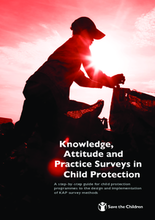Executive Summary
A KAP survey is a quantitative study of a specific population that collects information on what people know, how they feel, and how they behave in relation to a particular topic. Knowledge, Attitude and Practice (KAP) surveys can gather valuable data that may be used to strengthen child protection programme planning and design, advocacy, social mobilisation, assessment and evaluation.
Quantitative data describing people’s knowledge and behaviour related to child protection is critical for understanding the scale of protection issues and providing credible evidence for the development of national child protection systems, policy and practice. Despite wide recognition of the need for information, there is a lack of tested methodologies for gathering data relating to child protection. This guide aims to fill this gap by providing an overview of the key concepts, principles, and steps in conducting a KAP survey as well as tips, tools, resources and case studies tailored to the child protection sector. In addition to presenting learning around KAP surveys from other sectors, this guide draws on the experiences of two Save the Children country programmes (Sierra Leone and Liberia) that have successfully adapted KAP survey methods to child protection.
This guide is designed for all staff working on child protection programmes who need quantitative data on knowledge, attitudes and practices related to child protection. The objectives of this guide are to:
- Introduce the concept of KAP surveys in child protection;
- Help users determine if a KAP survey is an appropriate method for collecting data to be used on a child protection programme;
- Describe how to prepare for, implement and use the results of a KAP survey, offering valuable advice and learning from the field at each stage of the process; and
- Provide additional guidance on how to ensure the quality of KAP data and enhance the participation of children during the different steps of a survey.
The guide is not a comprehensive resource on research methodology, but aims to equip users with the essential knowledge and understanding needed to manage and commission a survey. Although survey methodology may appear straightforward, knowledge, attitudes and practices are very complex and there are many points at which the quality and validity of data may be compromised. It is therefore vital that any KAP survey is led by an experienced researcher who is able to anticipate and manage these challenges from the design stage onwards. Many Save the Children child protection programmes will commission an external consultant to lead a KAP survey and this guide will be a valuable resource for consultants and staff alike. Whether the survey is led internally or externally, this guide will help programme staff to maintain oversight, ask the right questions and take informed decisions to ensure the objectives of the survey are met and that programme staff and stakeholders – in particular children – keep ownership of the process and results.

